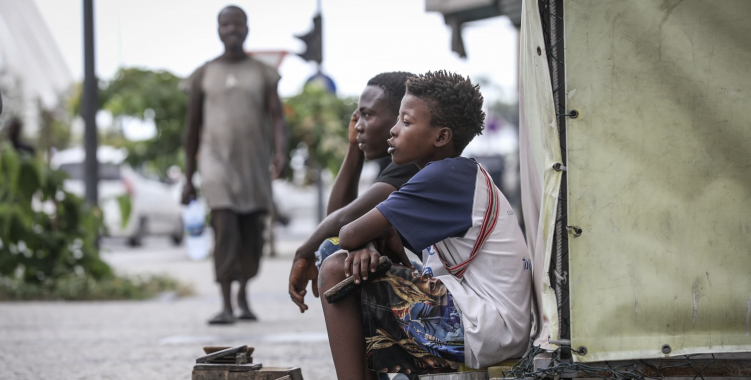Shining shoes or collecting rubbish from containers are activities involving hundreds of "candengues" (children) of school age who wander in small groups through the streets of the capital.
Hunger pushes them from the early hours of the day to the sidewalks in front of restaurants and public institutions, markets or taxi stops, where they save between 500 kwanzas and 2500 kwanzas every day for dinner at home.
Under the blue pedestrian bridge in the municipality of Cacuaco, one of the poorest and most populous in Luanda, Lusa found the brothers Francisco António Gamboa "Kilson", aged 12, and José António Gamboa "Géu", aged 13, squatting and armed with the respective shoe shine box, working every day to support his 90-year-old grandmother.
"Here I get between 500 kwanzas and 1500 kwanzas a day, part of the money is for food and the other part I save", the little shoe shiner Kilson, as he is known to his friends, told Lusa, with a sleepy face.
With the last two of his 12 years dedicated to "greasing," Kilson said he gets up early every day to make the seven-mile walk to work and keep his family from going hungry.
Children's month means "a lot of joy", but "I'm not happy about working on the streets", lamented the boy, shy and with a sad face, who dreams of being a bricklayer.
José António Gamboa "Géu", 13 years old, is Kilson's brother and also works as a shoe shiner, regretting the fact that he cannot attend school.
Barefoot and in worn-out shorts, Géu, who for a year has ensured the shine of the shoes of passers-by in the town of Cacuaco, knows that June is a month dedicated to children, but not all of them can celebrate.
"This month parents go for a walk with their children, but I don't (...). Right now I would be getting ready to go to school, but I'm here, I want to talk [appeal] to the Government to help us and help my grandmother, because she is suffering", he asks Lusa reporters.
Among the brothers Kilson and Géu, their colleague António da Conceição, 13 years old, resident in the urban district of Sequele, said he shines shoes to help his mother buy dinner for home.
António, who does not attend school due to his mother's lack of resources, said that he earns between 1500 and 2000 kwanzas daily, which he also tries to save so he can go to school.
With worn-out flip-flops and a backpack on his back, carrying the shoe shine box in his right hand, António Feliciano, 12 years old, was walking along Ho Chi Minh Avenue, for another day's journey, after leaving the Malanjinho neighborhood, where he lives.
"Here I can earn 2000 kwanzas a day, I don't study, I live with my mother, she doesn't have money to send me to school, with the money I get I buy clothes", said Feliciano, a shoe shiner for a year, confessing that he looks forward to attending school to be a police officer.
The little one also addressed the President: "I want to tell João Lourenço to help those children who are on the street to go to school", he appealed.
In front of the headquarters of the powerful Sonangol, the state oil company that is one of the engines of the national economy, in the center of Luanda, is João Adelino Augusto, 16 years old.
It's 11:30 am and he's working hard, leaning over the shoe shine box, to make sure his fifth customer of the day shines.
"Every day I can take something to help at home for dinner", he assured Lusa.
Nearby, Samuel Álvaro Paulo, 17, is on his daily mission of "picking up" metal and paper from trash containers.
For two years now, he has lived on one of the sidewalks on Rua Rainha Ginga, in downtown Luanda, where three containers are installed.
With a daily income that varies between 1000 and 1500 kwanzas, Samuel, who lives with his sister, said that his livelihood comes from garbage, regretting the fact that he gave up on his dream as a player, due to the country's difficulties.
"I dreamed of being a player, but I gave up because the country is 'cat'" (Angolan slang to portray difficult situations), he told Lusa, adding, with hope: "We will see what life will offer us in the future".
World Day Against Child Labor is celebrated on Wednesday, June 12th, when, for many children in the country, work means fighting a fight against hunger.







